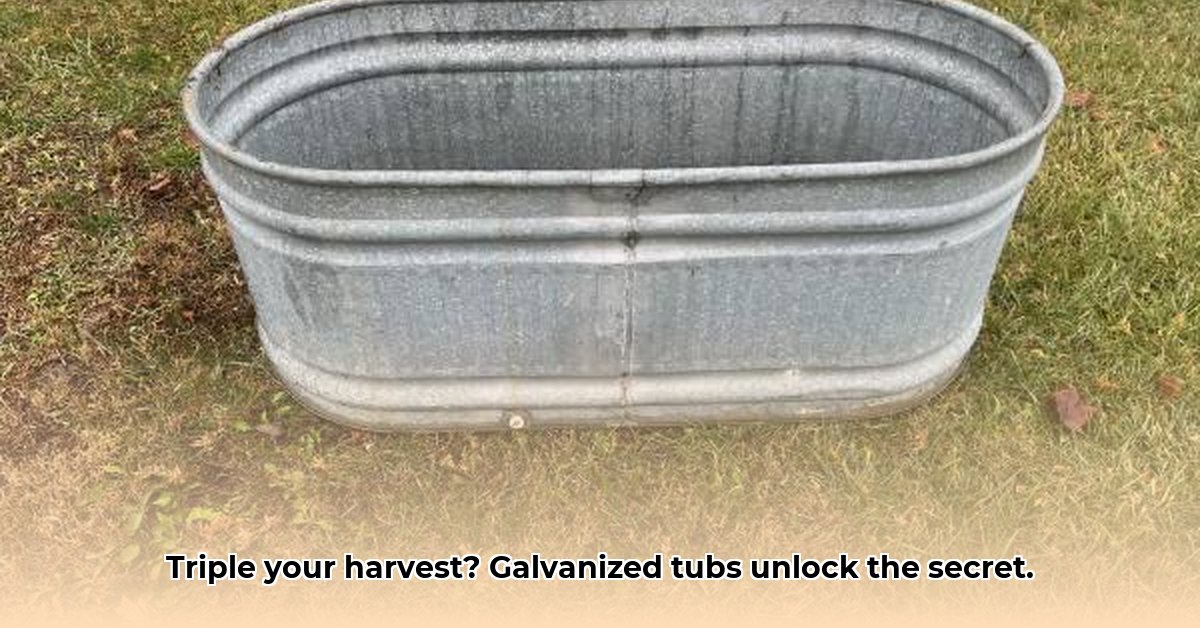
Galvanized Tubs from Tractor Supply: A Sustainable Farming Solution
Sustainable agriculture demands innovative solutions that balance economic viability with environmental responsibility. One often-overlooked aspect is efficient post-harvest handling and storage. Wasting food translates directly to financial losses and increased environmental impact. This article explores how galvanized steel tubs from Tractor Supply offer a durable, cost-effective, and surprisingly versatile solution for sustainable farming practices. For larger-scale storage, consider the 100-gallon stock tanks.
The widespread use of disposable plastic containers in agriculture contributes significantly to environmental pollution. These containers often end up in landfills, adding to the already substantial waste stream generated by modern farming. However, a shift toward reusable, durable alternatives like galvanized steel tubs offers a promising pathway to more sustainable practices. This transition not only reduces waste but also enhances efficiency and longevity in the farm setting. The question is, how can farmers benefit from and effectively utilize galvanized steel tubs?
The Durability Advantage: Long-Term Savings and Reduced Environmental Impact
Unlike flimsy plastic bins, galvanized steel tubs offer exceptional durability. They resist rust and corrosion, even under harsh farming conditions, leading to a significantly longer lifespan. This translates to fewer replacements, considerably reducing waste destined for landfills. How much waste can a farm realistically reduce by switching to galvanized steel tubs? While precise figures depend on individual farm practices, studies show that farms using reusable storage solutions can cut down on waste by over 50% compared to those relying on disposable containers.
Furthermore, the long-term cost savings associated with reduced replacements contribute to the economic viability of sustainable practices. The initial investment in galvanized steel tubs is often offset by the avoidance of repeated purchases of disposable alternatives. This creates a sustainable cycle where economic gains positively reinforce environmentally responsible choices. This economic benefit encourages broader adoption of sustainable solutions.
Versatile Applications Across the Farm
Galvanized steel tubs are not limited to simple storage. Their versatility makes them valuable tools throughout the farm and beyond. Their many applications include:
- Harvesting: Protect delicate fruits and vegetables during collection, minimizing damage and increasing marketability.
- Storage: Preserve produce freshness and quality by safeguarding against pests and spoilage, extending shelf life.
- Seed preservation: Maintain seed viability by keeping them dry and safe from pests.
- Transportation: Securely transport supplies and goods, eliminating spillage and damage during transit.
- Animal Feed Storage: Store animal feed cleanly and prevent contamination, ensuring livestock health.
- General Farm Use: Organize tools, collect rainwater (with proper setup), and even store firewood. These tubs are multifunctional and adaptable for various needs.
Beyond the Farm: Unexpected Uses and Broader Sustainability
The versatility extends beyond agricultural settings. The robust and durable design of galvanized steel tubs lends itself to various applications in home and business settings:
- Garage Organization: Keep tools organized and protected.
- Home Storage: An attractive and durable option for storing a wide range of items.
- Emergency Preparedness: Suitable for storing emergency supplies, offering superior protection compared to less durable containers.
Choosing the Right Tub: Size, Capacity, and Your Needs
Tractor Supply offers various sizes and capacities. Careful planning ensures purchasing the right size for your specific needs, avoiding unnecessary space waste and maximizing efficiency. Consider the volume of produce you harvest, the type of items you need to store, and the available storage space on your farm.
How to Implement Sustainable Post-Harvest Handling with Galvanized Steel Tubs
Minimizing post-harvest losses is paramount to both economic success and environmental stewardship. Losses from spoilage and damage can drastically reduce profits and contribute to food waste. The following detailed steps outline how to effectively use galvanized steel tubs to improve post-harvest handling:
Step-by-Step Guide:
- Assess Your Needs: Determine climate conditions, crop types, and budget to select appropriate tub sizes and quantities. Consider additional insulation in colder climates.
- Choose Your Tubs: Select galvanized steel tubs from Tractor Supply or similar retailers, ensuring they meet your size and capacity requirements. Prioritize quality and durability for long-term value.
- Prepare for Storage: Thoroughly clean and sanitize tubs before use to prevent mold and bacterial growth.
- Proper Handling: Exercise care when handling produce to minimize bruising and damage during placement and removal. Gentle handling helps maintain quality and extends storage life.
- Monitor Storage: Regularly inspect produce for signs of spoilage and implement appropriate measures, ensuring quick identification of potential losses and enabling timely intervention.
- Rotation and FIFO: Implement a "First In, First Out" (FIFO) system to prioritize the consumption or processing of older produce, reducing waste from spoilage.
Maximizing the Lifespan of Your Galvanized Tubs:
- Regular Cleaning: Thorough cleaning and disinfection after each use is essential for preventing mold and extending the lifespan of the tubs.
- Proper Storage: Store tubs in a dry, sheltered area when not in use to prevent rust and damage.
- Minor Repairs: Address minor dents or scratches promptly to prevent further deterioration and maintain durability.
By adopting these sustainable practices and incorporating galvanized steel tubs, farmers can directly contribute to a more environmentally conscious and economically viable agricultural system. The long-term benefits—both financial and environmental—make this a worthwhile investment in the future of farming.